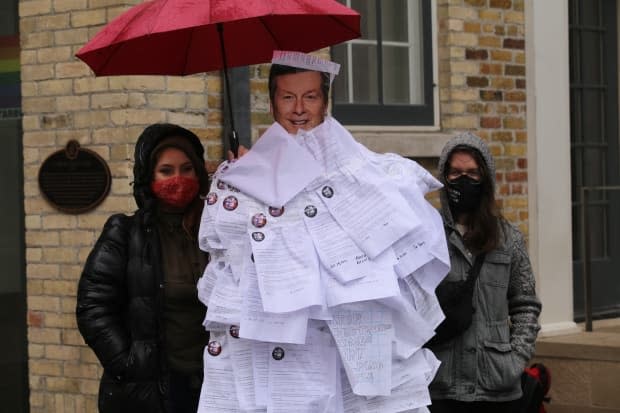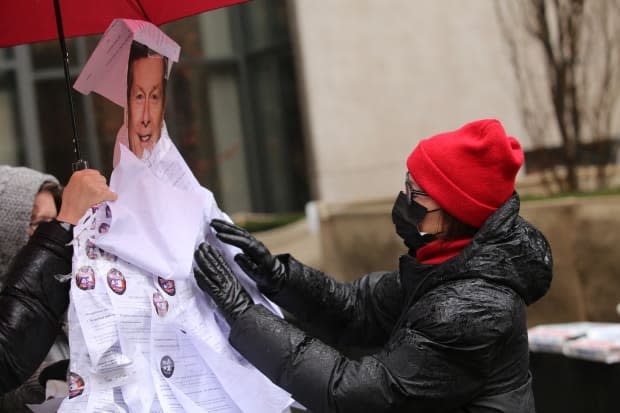Hundreds of people protest city decision to file application against Toronto carpenter

An estimated 800 people took time out on Sunday to protest a city decision to apply for a court injunction against a Toronto carpenter who has built dozens of tiny shelters now in parks across the city.
Over several hours, the protesters left notices on a cardboard cutout of Mayor John Tory outside his condo. The protesters want the city to drop the application, which was filed in Ontario Superior Court on Feb. 12 against Khaleel Seivwright.
The city filed the application to prevent what it considers illegal dumping of wooden shelters on city property. The city considers the wooden structures unsafe. Seivwright, named in the application, has said he constructed the shelters as a "temporary solution."
Members of the Encampment Support Network, an advocacy group, placed the cardboard cutout of the mayor outside his condo. A red umbrella was held over the cutout to keep it dry in the late February rain.
Greg Cook, an outreach worker with Sanctuary Ministries of Toronto and a member of the steering committee of Shelter and Housing Justice Network, told CBC News that the shelters made by Seivwright have given unhoused people a place to keep warm and a sense of security during winter.
Seivwright has stepped up, he added.
"The city, in response to this, instead of working with Khaleel or giving him an award for his service to people, has decided to serve an injunction and we think that's just reprehensible and really not OK," Cook said.
"We are here today to serve John Tory for this really awful act that he has done. We are serving him a notice and saying his actions are harmful and are violent."
Cook said the mayor is picking on the carpenter when the issue is about ineffective policy. Affordable housing is what is needed and the situation has worsened under Tory's tenure, he said.
There is currently nowhere for unhoused people to go, given that many shelters are at capacity every night or dealing with COVID-19 outbreaks, Cook said. Each tiny shelter is insulated and has a small window and a small door that can be locked and they protect unhoused people from getting frostbite, he said.
Ryan Smyth, a protester, said he "served" the mayor with a notice because he believes people need housing.
"Housing is a human right and I would like to show my support for that. And I think we need to stand up to the people in power sometimes," Smyth said.

The notices, which say they are from the "Superior Court of the People" between "Decent People" and "John Tory & His Developer Cronies," urge the mayor to drop the application, repeal the bylaws that criminalize camping in parks, and build housing.
The notices say the applicants are calling on the mayor and the municipal government to stop using the courts to harm carpenters, stop harassing people who are unhoused and to consider the basic survival needs of people over the greed of developers.
Protesters lined up at the Bloor Bedford Parkette to receive the notices and were asked to sign them before taping them to the cutout of the mayor. Tory was invited to come down to speak to the protesters, but given he did not appear, the cutout was his proxy.
The protest took place over seven hours to ensure protesters were able to distance physically from one another and tape the notices one by one during the COVID-19 pandemic.

Tory, for his part, said in an email to CBC News on Sunday that the city has been working hard to help unhoused people in Toronto. The city is providing more affordable housing space, has expanded the shelter system and has created new shelter hotels, he added.
"We are taking unprecedented and immediate action to help our homeless residents and ensure they have access to safe, indoor shelter. This is a priority for myself and every member of City Council," Tory said.
As for the tiny shelters, Tory said: "I want to assure people that the illegal wooden structures are only removed if one is abandoned or someone living in one accepts services and comes inside.
"Our Toronto Fire officials are clear that these structures are not safe. Staff are working to protect the safety of all residents, including our homeless residents. That is why the injunction simply asks that these illegal and unsafe structures no longer be placed in parks — no one is allowed to place structures in parks."
The city added in a statement on Sunday: "Encampments in City parks are illegal and unsafe. While the City continues to help more homeless residents find safe, indoor space, it has also taken enforcement action to address illegal wooden structures and the public safety risk they pose. The City has a duty to keep public spaces, including parks, safe and open for all residents."
City trying to make homelessness invisible, advocates say
According to homeless advocates, the application is an attempt by the city to make homelessness invisible in Toronto.
The application was filed before a fatal fire in a makeshift structure in a downtown Toronto park on Feb. 17. That structure became engulfed in flames in Orphans Green Park, in the area of Adelaide Street East and Power Street, in the city's Corktown neighbourhood.
A man inside the shelter was pronounced dead at the scene. It's not clear who built the structure destroyed by the fire.
Before the pandemic, there were encampments in Toronto but not in city parks. After the pandemic in March 2020, the encampments appeared in parks and began to grow in size. At one point, an estimated 1,000 people were living outside in encampments in Toronto, but advocates believe the number is close to 400 now.
Advocates have said that some unhoused people are reluctant to stay in city shelters because of the risk of COVID-19.
There are 10 shelters in outbreak and a total of 152 COVID-19 cases linked to the outbreaks. One downtown shelter for men, the Maxwell Meighen Centre, funded by the city but operated by the Salvation Centre, has 41 cases and is currently closed because of the outbreak there.
On Sunday, the city announced that vaccinations would begin for unhoused people in shelters starting this week. Toronto Public Health is expected to determine which shelters are at most risk of the novel coronavirus.

